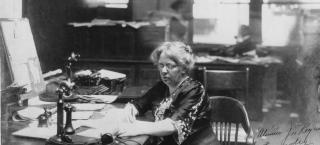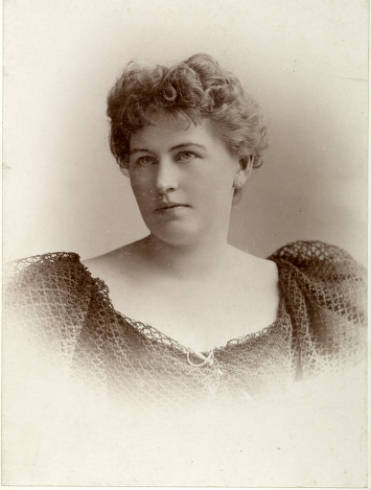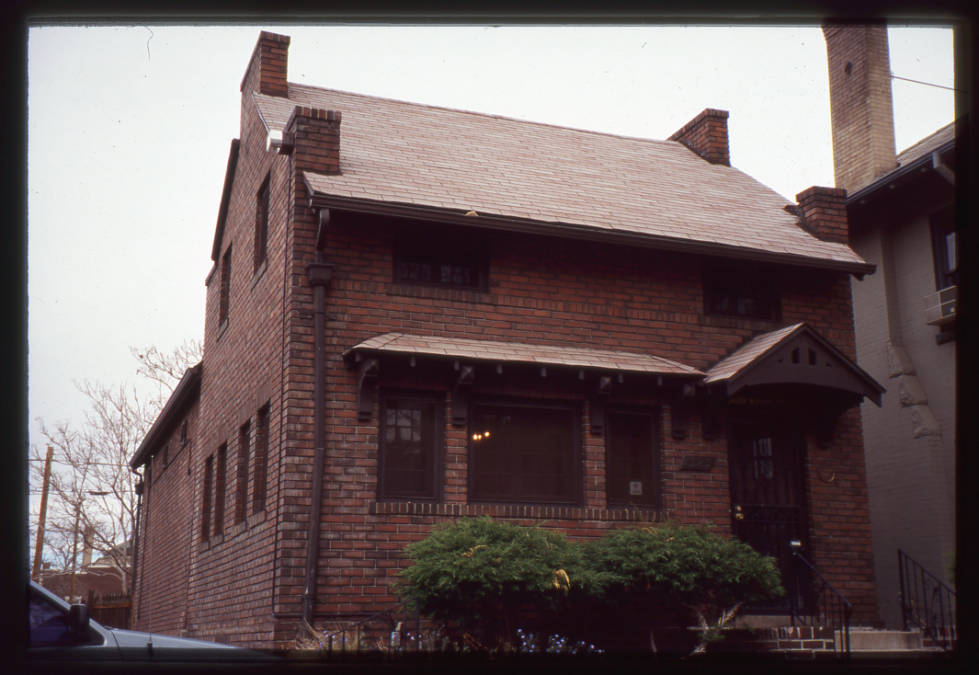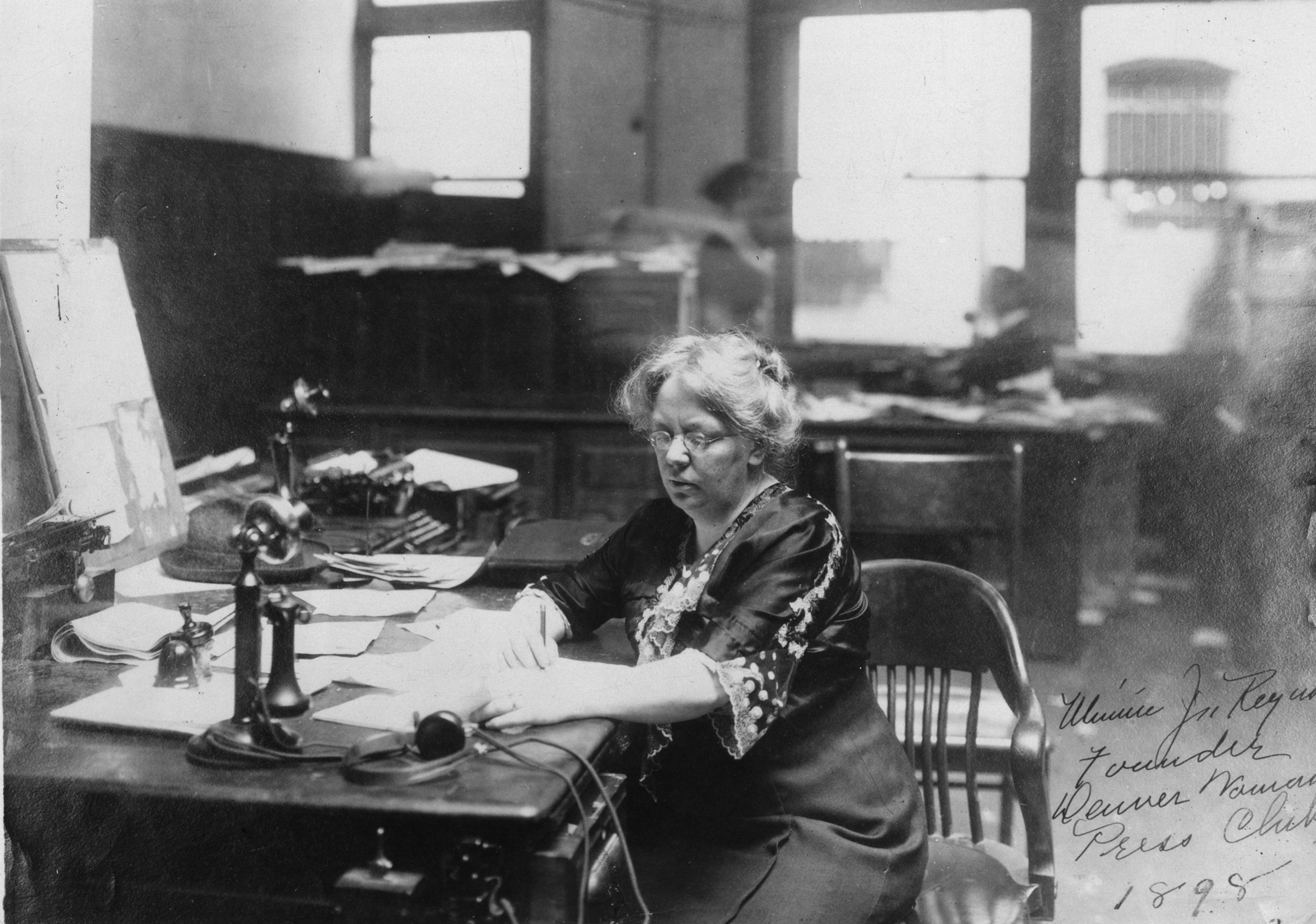
Story
Colorado's Kickoff to Woman Suffrage
Ever wonder how women a century ago tolerated the restrictions placed on them pre-equal rights and women’s lib? Clue: a number of them didn’t. While strictures then may have been weightier than today, women of independent mind, strong will, and dedicated principles simply ignored the limits society tried to impose and did what they had to do.
Take the women of the Denver Woman’s Press Club (DWPC). Established in 1898 by nineteen charter members, the group still flourishes today. The DWPC included organizer and first president Minnie J. Reynolds. Reynolds was an influential suffrage leader, serving as “Press Secretary” in the victorious 1893 Colorado women’s suffrage campaign, and later as a national suffrage organizer. She was one of the first female political writers for the Rocky Mountain News, and an early woman stump speaker and activist in the Populist Party.
The spunky founder of the club was born in 1865 in Norwood, New York. She caught the eye of the Rocky Mountain News editors with her writing, which she signed with her initials. Assuming she was a man, they offered her a job. When they discovered their error, they shunted her to the society page, but she soon moved to women’s pages editor and then political writing.
When the General Federation of Women’s Clubs planned a national conference in Denver for 1898, five years after women's suffrage had become law in the state due to the efforts of Reynolds and her ilk, they contacted Reynolds to ask if the city had a club for newspaperwomen. “It does now,” she must have muttered to herself as she hastily called an organizational meeting of writing colleagues. A constitution, bylaws, and official founding of the group followed. Reynolds continued to work for suffrage on the national level until the United States approved the federal amendment to the constitution in 1919.
Colorado was the first state to give women the vote through an election in which the current voters were required to approve the measure. In other words, men voted in support of the measure. So more than twenty-five years before the United States as a whole granted what now is seen as a basic right, the Centennial State set the bar.
The step occurred not simply through men’s good, will although men of good will worked side-by-side with like-minded women for decades for the achievement. An earlier attempt to enfranchise women in 1877 was voted down. An important fact for the final 1893 victory was an economic crisis involving the repeal of the Sherman Silver Purchase Act and the accompanying collapse of the silver market. Colorado plunged into an economic depression. Just as today, politicians jockeyed to develop solutions, and the Populist Party took control of the state legislature and governor’s office. In the subsequent election, women won the vote.
Throughout its history, the DWPC’s membership has included numerous women leaders, many of whom supported suffrage as well as excelling in other fields. Member Helen Ring Robinson, Colorado’s first woman state senator, was a suffragist. Like Reynolds, Robinson was a journalist for much of her career. Beginning as a teacher (another popular career for women), then moving to newspapers where she was a staffer for the Rocky Mountain News, she also served as secretary of the Colorado Board of Charities and Corrections, the springboard for her successful Senate run in 1913. During her four-year term, she sponsored legislation for a minimum wage for women and chaired the Senate Committee on Education.
Member Mary Elizabeth Bates, one of the first women doctors in Denver, also joined the Colorado Equal Suffrage Association. Dr. Bates never married and was known for her progressive political positions, including women's rights. One of the early leaders of the Dumb Friends League, upon her death in 1954, she left an estate gift that provided for homeless animals well beyond her lifetime. The Dr. Mary E. Bates Founders Society was established to recognize individuals who have followed in her footsteps and decided to leave a legacy gift to the Dumb Friends League.

Mrs. Leonel Ross (Campbell Anthony) O'Bryan, also known by her popular pen name "Polly Pry.”
Another DWPC suffragist was intrepid “yellow journalist” Polly Pry, a.k.a. Leonel Ross O’Bryan, so nicknamed because she could pry information out of anyone. As the first female reporter for The Denver Post, in 1901, Pry helped win the release of Alfred Packer, serving a life sentence in prison for cannibalizing his fellow hikers during a winter expedition in the Rockies. Her enduring fame in Denver history occurred when she protected her two male bosses from a gun-packing attorney named Anderson in their office. Anderson wounded both, one seriously. It could have been worse had Pry not jumped between the combatants, protected her bosses with her body, and wrestled the gun away from Anderson.
Another political cause for her was descriptive and dramatic writing about mine unions and miners, resulting in threats to her life. After she left the Post, Pry founded her own newspaper, Polly Pry, and became a strong advocate for women’s suffrage.
Among DWPC members breaking ground for their sex by choosing careers rather than simply serving as window dressing were:
- Mary Florence Lathrop, one of Denver’s first women lawyers;
- Alice Polk Hill, the first poet laureate named in Colorado;
- Helen Marie Black, first woman business manager of a major symphony orchestra, instrumental in the founding of the Denver Symphony Orchestra.

The Denver Woman's Press Club, founded in 1898, purchased their clubhouse in 1924. The building at 1325 Logan Street in Denver still houses the club to this day.
Over more than 120 years, members continued their ground-breaking achievements. In addition to female journalists at every newspaper and magazine, radio and television station, membership included novelists like Lenora Mattingly Weber; playwrights like Mary Coyle Chase of Harvey fame; many history buffs like Corinne Hunt, official historian for the Brown Palace Hotel; and short story writers and poets too numerous to list. The members were equal-opportunity writers. Dorothy Kostka sold fifteen to twenty stories a year to the popular publications called “the confessions” from the 30s to the 60s, the emotional equivalent of today’s social media sites except stories were fictionalized. Politics and activism continue to be of interest, such as member Pat Pascoe, who served twelve years in the Colorado State Senate, where she focused on education policy as well as publishing a biography of Helen Ring Robinson.
The DWPC’s goals and projects have always centered around advancing and encouraging women in literary work, loosely defined as writing. Because skill as a writer is useful in many occupations, members’ jobs run the gamut of freelancing, advertising, journalism, editing, and any other endeavor that depends on communications and writing skills. The group and its distinctive historic landmark house serve as a center where “professional women writers can connect.”
Nowadays the DWPC also includes a healthy scholarship and awards program as well as guest speakers and workshops open to the public. And in keeping with the philosophy of equal rights and equal opportunity, members do not have to be women, although no men have applied to date. Also important and contained in the bylaws from their origin to this day is the charge “to drive dull care away.”
Seems almost by definition women writers would be committed to the suffrage cause. Composition was one avenue for women to hold down a job. College degrees weren’t required, and native talent played a big role in producing acceptable work.
However, because this group was located in the West, it benefitted additionally from the rugged individualism traditionally found here. Zocalo Public Square, an Arizona State Knowledge Enterprise website, says in the years after the Civil War, women found plenty of opportunities in the West that were not available in the East, everything from equal pay for women teachers to more liberal divorce laws. The West was the first home of women’s suffrage in the United States, with nearly every western state or territory enfranchising women long before women won the right to vote in eastern states. It’s likely western men realized women were working hard right beside them to build lives from scratch.
In fact, from the times of the federal Homestead Act, signed into law by President Abraham Lincoln in 1862, the country encouraged western migration by providing settlers 160 acres of public land. Although married women didn’t qualify on their own for the bounty, single, widowed, and divorced women could. And women who outlived their shorter-lived husbands could inherit the land.
It appeared Colorado’s women, including the DWPC, didn’t hesitate to stick their fingers into any political pie. Ten days after the World War I Armistice, the DWPC membership addressed a letter to President Woodrow Wilson, urging him to appoint at least one woman to the Peace Commission. “The nation and the world stand in vital need of woman’s wisdom, her clear vision and her fine judgment in solving the problems that confront the peace commission,” the resolution read.
The group is an example of how intelligent, independent, and committed women helped alter the political landscape of the state and the nation. No wonder these activist, feisty women improved the world in which they lived. Role models, hard workers, humanistic, they lived the motto touted on bumper stickers and in speeches: “Be the change you wish to see,” a role that continues today.

